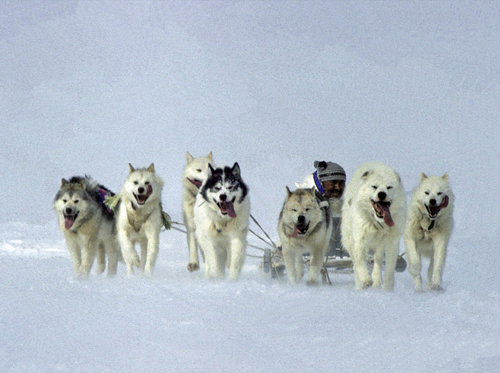From the Editor... The Next Hill
Fan Mail...
Passage: Lydudmila Bogoslovskaya
Inuit Dogs Indigenous Heritage Confirmed!
Pangaggujjiniq Nunavut Quest 2015
British Explorers Dogged by Myths
Making of The Savage Innocents
Paving over Cultural Identity Update
In the News...
Bannock: The Movie!
Media Review... Never Alone
IMHO... It Ain't Easy
Navigating This Site
Index of articles by subject
Index of back issues by volume number
Search The Fan Hitch
Articles to download and print
Ordering Ken MacRury's Thesis
Our comprehensive list of resources
Defining the Inuit Dog
Talk to The Fan Hitch
The Fan Hitch home page
Editor: Sue Hamilton
Webmaster: Mark Hamilton
The Fan Hitch, Journal
of the Inuit Sled Dog, is published four
times a year. It is available at no cost
online at: https://thefanhitch.org.
The Fan Hitch welcomes your letters, stories, comments and suggestions. The editorial staff reserves the right to edit submissions used for publication.
Contents of The Fan Hitch are protected by international copyright laws. No photo, drawing or text may be reproduced in any form without written consent. Webmasters please note: written consent is necessary before linking this site to yours! Please forward requests to Sue Hamilton, 55 Town Line Rd., Harwinton, Connecticut 06791, USA or mail@thefanhitch.org.
This site is dedicated to the Inuit Dog as well as related Inuit culture and traditions. It is also home to The Fan Hitch, Journal of the Inuit Sled Dog.
The Fan Hitch welcomes your letters, stories, comments and suggestions. The editorial staff reserves the right to edit submissions used for publication.
Contents of The Fan Hitch are protected by international copyright laws. No photo, drawing or text may be reproduced in any form without written consent. Webmasters please note: written consent is necessary before linking this site to yours! Please forward requests to Sue Hamilton, 55 Town Line Rd., Harwinton, Connecticut 06791, USA or mail@thefanhitch.org.
This site is dedicated to the Inuit Dog as well as related Inuit culture and traditions. It is also home to The Fan Hitch, Journal of the Inuit Sled Dog.

Joshua Kango winning Toonik Tyme Dogteam race (Iqaluit, Nunavut)
Nick Newbery/Government of Nunavut
Using Multiple Markers to Elucidate the Ancient, Historical, and
Modern Relationships Among North American Arctic Dog Breeds
S. K. Brown, C. M. Darwent, E.J. Wictum, and B. N. Sacks
Throughout most of the Americas, post-colonial dogs largely erased the genetic signatures of pre-historical dogs. However, the North American Arctic harbors dogs potentially descended from pre-historical ancestors, as well as those affected by post-colonial translocations and admixtures. In particular, Inuit dogs from Canada and Greenland are thought to descend from dogs associated with Thule peoples, who relied on them for transportation ca. 1,000 years ago. Whether Thule dogs reflected an earlier colonization by Paleoeskimo dogs ca. 4,500 years ago is unknown. Today’s Inuit dogs of Canada and Greenland seem to most likely be the descendants of pre-colonial indigenous dogs. Since European colonization, and particularly during the Alaskan Gold Rush, however, inhabitants of the Arctic have adopted as sled dogs several additional breeds or types, including the Alaskan Husky (created in post-colonial North America), Alaskan Malamute (hereafter, Malamute), and Siberian Husky. Although these types are of similar form and function to the Inuit dog, their genealogical relationships are unclear. The genealogical relationships among and origins of these breeds, and indigenous nature are unknown. Here we use autosomal, paternal and maternal DNA markers to (1) test the hypothesis that Inuit dogs have retained their indigenous ancestry, (2) characterize their relationship to one another and to other Arctic breeds, and (3) estimate the age of North American indigenous matrilines and patrilines. We determined, based on agreement of all three markers that Inuit dogs have maintained their indigenous nature, and that they likely derive from Thule dogs. Additionally, we provide support for previous research that the Inuit dogs from Canada and Greenland dog should not be distinguished as two breeds. The Alaskan Husky displayed evidence of European introgression, in contrast to the Malamute and Siberian Husky, which appear to have maintained most of their ancient Siberian ancestry.
Abstract modified from: S K Brown, C M Darwent, E J Wictum and B N Sacks. 2015. Using multiple markers to elucidate the ancient, historical and modern relationships among North American Arctic dog breeds. Heredity advance online publication 24 June 2015; doi: 10.1038/hdy.2015.49
ED: This research was conducted at the University of California at Davis. The Fan Hitch is hugely indebted to Sarah Brown for providing this synopsis. Dr. Brown has invited anyone wishing to obtain the complete research paper to email her at sbrown36@ucmerced.edu.